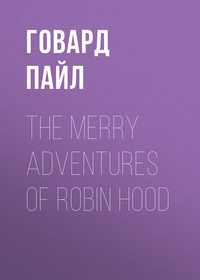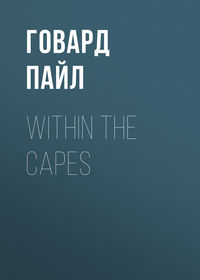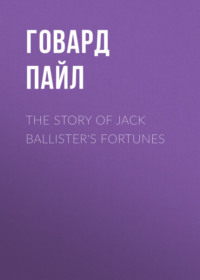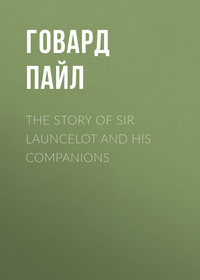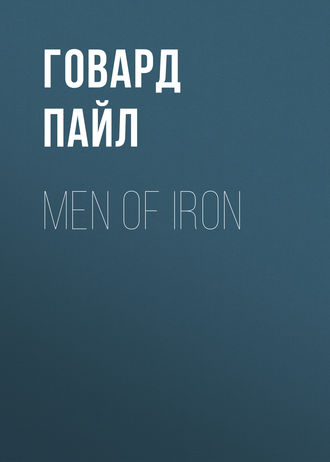 полная версия
полная версияMen of Iron
Five minutes later he was busy arming him in the little room at the end of the dormitory which had been lately set apart for the use of the head bachelor. “And to think,” he said, looking up as he kneeled, strapping the thigh-plates to his friend’s legs, “that he should have chosen thee before all others of the fine knights and lords and gentlemen of quality that are here!”
“Yea,” said Myles, “it passeth wonder. I know not why he should so single me out for such an honor. It is strangely marvellous.”
“Nay,” said Gascoyne, “there is no marvel in it, and I know right well why he chooseth thee. It is because he sees, as we all see, that thou art the stoutest and the best-skilled in arms, and most easy of carriage of any man in all this place.”
Myles laughed. “An thou make sport of me,” said he, “I’ll rap thy head with this dagger hilt. Thou art a silly fellow, Francis, to talk so. But tell me, hast thou heard who rides with my Lord?”
“Yea, I heard Wilkes say anon that it was Sir James Lee.”
“I am right glad of that,” said Myles; “for then he will show me what to do and how to bear myself. It frights me to think what would hap should I make some mistake in my awkwardness. Methinks Lord George would never have me with him more should I do amiss this day.”
“Never fear,” said Gascoyne; “thou wilt not do amiss.”
And now, at last, the Earl, Lord George, and all their escort were ready; then the orders were given to horse, the bugle sounded, and away they all rode, with clashing of iron hoofs and ringing and jingling of armor, out into the dewy freshness of the early morning, the slant yellow sun of autumn blazing and flaming upon polished helmets and shields, and twinkling like sparks of fire upon spear points. Myles’s heart thrilled within him for pure joy, and he swelled out his sturdy young breast with great draughts of the sweet fresh air that came singing across the sunny hill-tops. Sir James Lee, who acted as the Earl’s equerry for the day, rode at a little distance, and there was an almost pathetic contrast between the grim, steadfast impassiveness of the tough old warrior and Myles’s passionate exuberance of youth.
At the head of the party rode the Earl and his brother side by side, each clad cap-a-pie in a suit of Milan armor, the cuirass of each covered with a velvet juppon embroidered in silver with the arms and quarterings of the Beaumonts. The Earl wore around his neck an “S S” collar, with a jewelled St. George hanging from it, and upon his head a vizored bascinet, ornamented with a wreath covered with black and yellow velvet and glistening with jewels.
Lord George, as was said before, was clad in a beautiful suit of ribbed Milan armor. It was rimmed with a thin thread of gold, and, like his brother, he wore a bascinet wreathed with black and yellow velvet.
Behind the two brothers and their equerries rode the rest in their proper order – knights, gentlemen, esquires, men-at-arms – to the number, perhaps, of two hundred and fifty; spears and lances aslant, and banners, permons, and pencels of black and yellow fluttering in the warm September air.
From the castle to the town they rode, and then across the bridge, and thence clattering up through the stony streets, where the folk looked down upon them from the windows above, or crowded the fronts of the shops of the tradesmen. Lusty cheers were shouted for the Earl, but the great Lord rode staring ever straight before him, as unmoved as a stone. Then out of the town they clattered, and away in a sweeping cloud of dust across the country-side.
It was not until they had reached the windy top of Willoughby Croft, ten miles away, that they met the King and his company. As the two parties approached to within forty or fifty yards of one another they stopped.
As they came to a halt, Myles observed that a gentleman dressed in a plain blue-gray riding-habit, and sitting upon a beautiful white gelding, stood a little in advance of the rest of the party, and he knew that that must be the King. Then Sir James nodded to Myles, and leaping from his horse, flung the reins to one of the attendants. Myles did the like; and then, still following Sir James’s lead as he served Lord Mackworth, went forward and held Lord George’s stirrup while he dismounted. The two noblemen quickly removed each his bascinet, and Myles, holding the bridle-rein of Lord George’s horse with his left hand, took the helmet in his right, resting it upon his hip.
Then the two brothers walked forward bare-headed, the Earl, a little in advance. Reaching the King he stopped, and then bent his knee – stiffly in the armored plates – until it touched the ground. Thereupon the King reached him his hand, and he, rising again, took it, and set it to his lips.
Then Lord George, advancing, kneeled as his brother had kneeled, and to him also the King gave his hand.
Myles could hear nothing, but he could see that a few words of greeting passed between the three, and then the King, turning, beckoned to a knight who stood just behind him and a little in advance of the others of the troop. In answer, the knight rode forward; the King spoke a few words of introduction, and the stranger, ceremoniously drawing off his right gauntlet, clasped the hand, first of the Earl, and then of Lord George. Myles knew that he must be the great Comte de Vermoise, of whom he had heard so much of late.
A few moments of conversation followed, and then the King bowed slightly. The French nobleman instantly reined back his horse, an order was given, and then the whole company moved forward, the two brothers walking upon either side of the King, the Earl lightly touching the bridle-rein with his bare hand.
Whilst all this was passing, the Earl of Mackworth’s company had been drawn up in a double line along the road-side, leaving the way open to the other party. As the King reached the head of the troop, another halt followed while he spoke a few courteous words of greeting to some of the lesser nobles attendant upon the Earl whom he knew.
In that little time he was within a few paces of Myles, who stood motionless as a statue, holding the bascinet and the bridle-rein of Lord George’s horse.
What Myles saw was a plain, rather stout man, with a face fat, smooth, and waxy, with pale-blue eyes, and baggy in the lids; clean shaven, except for a mustache and tuft covering lips and chin. Somehow he felt a deep disappointment. He had expected to see something lion-like, something regal, and, after all, the great King Henry was commonplace, fat, unwholesome-looking. It came to him with a sort of a shock that, after all, a King was in nowise different from other men.
Meanwhile the Earl and his brother replaced their bascinets, and presently the whole party moved forward upon the way to Mackworth.
CHAPTER 23
That same afternoon the squires’ quarters were thrown into such a ferment of excitement as had, perhaps, never before stirred them. About one o’clock in the afternoon the Earl himself and Lord George came walking slowly across the Armory Court wrapped in deep conversation, and entered Sir James Lee’s office.
All the usual hubbub of noise that surrounded the neighborhood of the dormitory and the armory was stilled at their coming, and when the two noblemen had entered Sir James’s office, the lads and young men gathered in knots discussing with an almost awesome interest what that visit might portend.
After some time Sir James Lee came to the door at the head of the long flight of stone steps, and whistling, beckoned one of the smaller pages to him. He gave a short order that sent the little fellow flying on some mission. In the course of a few minutes he returned, hurrying across the stony court with Myles Falworth, who presently entered Sir James’s office. It was then and at this sight that the intense half-suppressed excitement reached its height of fever-heat. What did it all mean? The air was filled with a thousand vague, wild rumors – but the very wildest surmises fell short of the real truth.
Perhaps Myles was somewhat pale when he entered the office; certainly his nerves were in a tremor, for his heart told him that something very portentous was about to befall him. The Earl sat at the table, and in the seat that Sir James Lee usually occupied; Lord George half sat, half leaned in the window-place. Sir James stood with his back to the empty fireplace, and his hands clasped behind him. All three were very serious.
“Give thee good den, Myles Falworth,” said the Earl, as Myles bowed first to him and then to the others; “and I would have thee prepare thyself for a great happening.” Then, continuing directly to the point: “Thou knowest, sirrah, why we have been training thee so closely these three years gone; it is that thou shouldst be able to hold thine own in the world. Nay, not only hold thine own, but to show thyself to be a knight of prowess shouldst it come to a battle between thee and thy father’s enemy; for there lieth no half-way place for thee, and thou must be either great or else nothing. Well, sir, the time hath now come for thee to show thy mettle. I would rather have chosen that thou hadst labored a twelvemonth longer; but now, as I said, hath come a chance to prove thyself that may never come again. Sir James tells me that thou art passably ripe in skill. Thou must now show whether that be so or no. Hast thou ever heard of the Sieur de la Montaigne?”
“Yea, my Lord. I have heard of him often,” answered Myles. “It was he who won the prize at the great tourney at Rochelle last year.”
“I see that thou hast his fame pat to thy tongue’s end,” said the Earl; “he is the chevalier of whom I speak, and he is reckoned the best knight of Dauphiny. That one of which thou spokest was the third great tourney in which he was adjudged the victor. I am glad that thou holdest his prowess highly. Knowest thou that he is in the train of the Comte de Vermoise?”
“Nay,” said Myles, flushing; “I did hear news he was in England, but knew not that he was in this place.”
“Yea,” said Lord Mackworth; “he is here.” He paused for a moment; then said, suddenly. “Tell me, Myles Falworth, an thou wert a knight and of rank fit to run a joust with the Sieur de la Montaigne, wouldst thou dare encounter him in the lists?”
The Earl’s question fell upon Myles so suddenly and unexpectedly that for a moment or so he stood staring at the speaker with mouth agape. Meanwhile the Earl sat looking calmly back at him, slowly stroking his beard the while.
It was Sir James Lee’s voice that broke the silence. “Thou heardst thy Lord speak,” said he, harshly. “Hast thou no tongue to answer, sirrah?”
“Be silent, Lee,” said Lord Mackworth, quietly. “Let the lad have time to think before he speaketh.”
The sound of the words aroused Myles. He advanced to the table, and rested his hand upon it. “My Lord – my Lord,” said he, “I know not what to say, I – I am amazed and afeard.”
“How! how!” cried Sir James Lee, harshly. “Afeard, sayst thou? An thou art afeard, thou knave, thou needst never look upon my face or speak to me more! I have done with thee forever an thou art afeard even were the champion a Sir Alisander.”
“Peace, peace, Lee,” said the Earl, holding up his hand. “Thou art too hasty. The lad shall have his will in this matter, and thou and no one shall constrain him. Methinks, also, thou dost not understand him. Speak from thy heart, Myles; why art thou afraid?”
“Because,” said Myles, “I am so young, sir; I am but a raw boy. How should I dare be so hardy as to venture to set lance against such an one as the Sieur de la Montaigne? What would I be but a laughing-stock for all the world who would see me so foolish as to venture me against one of such prowess and skill?”
“Nay, Myles,” said Lord George, “thou thinkest not well enough of thine own skill and prowess. Thinkest thou we would undertake to set thee against him, an we did not think that thou couldst hold thine own fairly well?”
“Hold mine own?” cried Myles, turning to Lord George. “Sir; thou dost not mean – thou canst not mean, that I may hope or dream to hold mine own against the Sieur de la Montaigne.”
“Aye,” said Lord George, “that was what I did mean.”
“Come, Myles,” said the Earl; “now tell me: wilt thou fight the Sieur de la Montaigne?”
“Yea,” said Myles, drawing himself to his full height and throwing out his chest. “Yea,” and his cheeks and forehead flushed red; “an thou bid me do so, I will fight him.”
“There spake my brave lad!” cried Lord George heartily.
“I give thee joy, Myles,” said the Earl, reaching him his hand, which Myles took and kissed. “And I give thee double joy. I have talked with the King concerning thee this morning, and he hath consented to knight thee – yea, to knight thee with all honors of the Bath – provided thou wilt match thee against the Sieur de la Montaigne for the honor of England and Mackworth. Just now the King lieth to sleep for a little while after his dinner; have thyself in readiness when he cometh forth, and I will have thee presented.”
Then the Earl turned to Sir James Lee, and questioned him as to how the bachelors were fitted with clothes. Myles listened, only half hearing the words through the tumbling of his thoughts. He had dreamed in his day-dreams that some time he might be knighted, but that time always seemed very, very distant. To be knighted now, in his boyhood, by the King, with the honors of the Bath, and under the patronage of the Earl of Mackworth; to joust – to actually joust – with the Sieur de la Montaigne, one of the most famous chevaliers of France! No wonder he only half heard the words; half heard the Earl’s questions concerning his clothes and the discussion which followed; half heard Lord George volunteer to array him in fitting garments from his own wardrobe.
“Thou mayst go now,” said the Earl, at last turning to him. “But be thou at George’s apartments by two of the clock to be dressed fittingly for the occasion.”
Then Myles went out stupefied, dazed, bewildered. He looked around, but he did not see Gascoyne. He said not a word to any of the others in answer to the eager questions poured upon him by his fellow-squires, but walked straight away. He hardly knew where he went, but by-and-by he found himself in a grassy angle below the end of the south stable; a spot overlooking the outer wall and the river beyond. He looked around; no one was near, and he flung himself at length, burying his face in his arms. How long he lay there he did not know, but suddenly some one touched him upon the shoulder, and he sprang up quickly. It was Gascoyne.
“What is to do, Myles?” said his friend, anxiously. “What is all this talk I hear concerning thee up yonder at the armory?”
“Oh, Francis!” cried Myles, with a husky choking voice: “I am to be knighted – by the King – by the King himself; and I – I am to fight the Sieur de la Montaigne.”
He reached out his hand, and Gascoyne took it. They stood for a while quite silent, and when at last the stillness was broken, it was Gascoyne who spoke, in a choking voice.
“Thou art going to be great, Myles,” said he. “I always knew that it must be so with thee, and now the time hath come. Yea, thou wilt be great, and live at court amongst noble folk, and Kings haply. Presently thou wilt not be with me any more, and wilt forget me by-and-by.”
“Nay, Francis, never will I forget thee!” answered Myles, pressing his friend’s hand. “I will always love thee better than any one in the world, saving only my father and my mother.”
Gascoyne shook his head and looked away, swallowing at the dry lump in his throat. Suddenly he turned to Myles. “Wilt thou grant me a boon?”
“Yea,” answered Myles. “What is it?”
“That thou wilt choose me for thy squire.”
“Nay,” said Myles; “how canst thou think to serve me as squire? Thou wilt be a knight thyself some day, Francis, and why dost thou wish now to be my squire?”
“Because,” said Gascoyne, with a short laugh, “I would rather be in thy company as a squire than in mine own as a knight, even if I might be banneret.”
Myles flung his arm around his friend’s neck, and kissed him upon the cheek. “Thou shalt have thy will,” said he; “but whether knight or squire, thou art ever mine own true friend.”
Then they went slowly back together, hand in hand, to the castle world again.
At two o’clock Myles went to Lord George’s apartments, and there his friend and patron dressed him out in a costume better fitted for the ceremony of presentation – a fur-trimmed jacket of green brocaded velvet embroidered with golden thread, a black velvet hood-cap rolled like a turban and with a jewel in the front, a pair of crimson hose, and a pair of black velvet shoes trimmed and stitched with gold-thread. Myles had never worn such splendid clothes in his life before, and he could not but feel that they became him well.
“Sir,” said he, as he looked down at himself, “sure it is not lawful for me to wear such clothes as these.”
In those days there was a law, known as a sumptuary law, which regulated by statute the clothes that each class of people were privileged to wear. It was, as Myles said, against the law for him to wear such garments as those in which he was clad – either velvet, crimson stuff, fur or silver or gold embroidery – nevertheless such a solemn ceremony as presentation to the King excused the temporary overstepping of the law, and so Lord George told him. As he laid his hand upon the lad’s shoulder and held him off at arm’s-length, he added, “And I pledge thee my word, Myles, that thou art as lusty and handsome a lad as ever mine eyes beheld.”
“Thou art very kind to me, sir,” said Myles, in answer.
Lord George laughed; and then giving him a shake, let go his shoulder.
It was about three o’clock when little Edmond de Montefort, Lord Mackworth’s favorite page, came with word that the King was then walking in the Earl’s pleasance.
“Come, Myles,” said Lord George, and then Myles arose from the seat where he had been sitting, his heart palpitating and throbbing tumultuously.
At the wicket-gate of the pleasance two gentlemen-at-arms stood guard in half-armor; they saluted Lord George, and permitted him to pass with his protege. As he laid his hand upon the latch of the wicket he paused for a moment and turned.
“Myles,” said he, in a low voice, “thou art a thoughtful and cautious lad; for thy father’s sake be thoughtful and cautious now. Do not speak his name or betray that thou art his son.” Then he opened the wicket-gate and entered.
Any lad of Myles’s age, even one far more used to the world than he, would perhaps have felt all the oppression that he experienced under the weight of such a presentation. He hardly knew what he was doing as Lord George led him to where the King stood, a little apart from the attendants, with the Earl and the Comte de Vermoise. Even in his confusion he knew enough to kneel, and somehow his honest, modest diffidence became the young fellow very well. He was not awkward, for one so healthful in mind and body as he could not bear himself very ill, and he felt the assurance that in Lord George he had a kind friend at his side, and one well used to court ceremonies to lend him countenance. Then there is something always pleasing in frank, modest manliness such as was stamped on Myles’s handsome, sturdy face. No doubt the King’s heart warmed towards the fledgling warrior kneeling in the pathway before him. He smiled very kindly as he gave the lad his hand to kiss, and that ceremony done, held fast to the hard, brown, sinewy fist of the young man with his soft white hand, and raised him to his feet.
“By the mass!” said he, looking Myles over with smiling eyes, “thou art a right champion in good sooth. Such as thou art haply was Sir Galahad when he came to Arthur’s court. And so they tell me, thou hast stomach to brook the Sieur de la Montaigne, that tough old boar of Dauphiny. Hast thou in good sooth the courage to face him? Knowest thou what a great thing it is that thou hast set upon thyself – to do battle, even in sport, with him?”
“Yea, your Majesty,” answered Myles, “well I wot it is a task haply beyond me. But gladly would I take upon me even a greater venture, and one more dangerous, to do your Majesty’s pleasure!”
The King looked pleased. “Now that was right well said, young man,” said he, “and I like it better that it came from such young and honest lips. Dost thou speak French?”
“Yea, your Majesty,” answered Myles. “In some small measure do I so.”
“I am glad of that,” said the King; “for so I may make thee acquainted with Sieur de la Montaigne.”
He turned as he ended speaking, and beckoned to a heavy, thick-set, black-browed chevalier who stood with the other gentlemen attendants at a little distance. He came instantly forward in answer to the summons, and the King introduced the two to one another. As each took the other formally by the hand, he measured his opponent hastily, body and limb, and perhaps each thought that he had never seen a stronger, stouter, better-knit man than the one upon whom he looked. But nevertheless the contrast betwixt the two was very great – Myles, young, boyish, fresh-faced; the other, bronzed, weather beaten, and seamed with a great white scar that ran across his forehead and cheek; the one a novice, the other a warrior seasoned in twoscore battles.
A few polite phrases passed between the two, the King listening smiling, but with an absent and far-away look gradually stealing upon his face. As they ended speaking, a little pause of silence followed, and then the King suddenly aroused himself.
“So,” said he, “I am glad that ye two are acquainted. And now we will leave our youthful champion in thy charge, Beaumont – and in thine, Mon Sieur, as well – and so soon as the proper ceremonies are ended, we will dub him knight with our own hands. And now, Mackworth, and thou my Lord Count, let us walk a little; I have bethought me further concerning these threescore extra men for Dauphiny.”
Then Myles withdrew, under the charge of Lord George and the Sieur de la Montaigne and while the King and the two nobles walked slowly up and down the gravel path between the tall rose-bushes, Myles stood talking with the gentlemen attendants, finding himself, with a certain triumphant exultation, the peer of any and the hero of the hour.
That night was the last that Myles and Gascoyne spent lodging in the dormitory in their squirehood service. The next day they were assigned apartments in Lord George’s part of the house, and thither they transported themselves and their belongings, amid the awestruck wonder and admiration of their fellow-squires.
CHAPTER 24
In Myles Falworth’s day one of the greatest ceremonies of courtly life was that of the bestowal of knighthood by the King, with the honors of the Bath. By far the greater number of knights were at that time created by other knights, or by nobles, or by officers of the crown. To be knighted by the King in person distinguished the recipient for life. It was this signal honor that the Earl, for his own purposes, wished Myles to enjoy, and for this end he had laid not a few plans.
The accolade was the term used for the creation of a knight upon the field of battle. It was a reward of valor or of meritorious service, and was generally bestowed in a more or less off-hand way; but the ceremony of the Bath was an occasion of the greatest courtly moment, and it was thus that Myles Falworth was to be knighted in addition to the honor of a royal belting.
A quaint old book treating of knighthood and chivalry gives a full and detailed account of all the circumstances of the ceremony of a creation of a Knight of the Bath. It tells us that the candidate was first placed under the care of two squires of honor, “grave and well seen in courtship and nurture, and also in feats of chivalry,” which same were likewise to be governors in all things relating to the coming honors.
First of all, the barber shaved him, and cut his hair in a certain peculiar fashion ordained for the occasion, the squires of honor supervising the operation. This being concluded, the candidate was solemnly conducted to the chamber where the bath of tepid water was prepared, “hung within and without with linen, and likewise covered with rich cloths and embroidered linen.” While in the bath two “ancient, grave, and reverend knights” attended the bachelor, giving him “meet instructions in the order and feats of chivalry.” The candidate was then examined as to his knowledge and acquirements, and then, all questions being answered to the satisfaction of his examiners, the elder of the two dipped a handful of water out from the bath, and poured it upon his head, at the same time signing his left shoulder with the sign of the cross.



